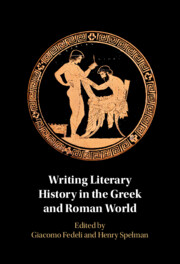Book contents
- Writing Literary History in the Greek and Roman World
- Writing Literary History in the Greek and Roman World
- Copyright page
- Contents
- Contributors
- Introduction
- Part I Between Literature and Scholarship
- Part II Lives and Afterlives
- Chapter 6 From Comedy to Literary History
- Chapter 7 Constructing Virgil and His Biography
- Chapter 8 ‘Another X’
- Chapter 9 Philostratus in Verse
- Part III Narratives of Change
- Epilogue
- Afterword
- Bibliography
- Index Locorum
- Index of Subjects
Chapter 9 - Philostratus in Verse
Poetry and Literary History in the Second Sophistic
from Part II - Lives and Afterlives
Published online by Cambridge University Press: 07 June 2024
- Writing Literary History in the Greek and Roman World
- Writing Literary History in the Greek and Roman World
- Copyright page
- Contents
- Contributors
- Introduction
- Part I Between Literature and Scholarship
- Part II Lives and Afterlives
- Chapter 6 From Comedy to Literary History
- Chapter 7 Constructing Virgil and His Biography
- Chapter 8 ‘Another X’
- Chapter 9 Philostratus in Verse
- Part III Narratives of Change
- Epilogue
- Afterword
- Bibliography
- Index Locorum
- Index of Subjects
Summary
This chapter takes the history of literary history beyond the confines of the classical period, and past the formal parameters of prose. Its focus is Philostratus’ depiction of the Second Sophistic, one of most instrumental and contentious ancient models of epoch-making. The Second Sophistic is conventionally considered a world of prose. I make the case for the central role of poetry in Philostratus’ conception of its literary identity. After some preliminary remarks on the complex construct of the Second Sophistic as a cultural phenomenon, and the undoubtable but controversial role of Philostratus at the centre of it, I offer a close reading of the multiple moments of poetry within the Vitae Sophistarum, which shed new light on Philostratus’ approach to the textuality and temporality of this milieu. The chapter ends by discussing the Heroicus, which contains Philostratus’ most elaborate verse compositions, and sees the voices of ancient poets resurrected into new sophistic poetry. This close encounter with Philostratean verse reveals an active and experimental approach to the poetic tradition which treats canonical verse texts as both bounded and closed, and inherently unfinished, and where the lines between old and new, verse and prose, exegesis and literature are interrogated and undermined.
- Type
- Chapter
- Information
- Writing Literary History in the Greek and Roman World , pp. 187 - 210Publisher: Cambridge University PressPrint publication year: 2024

